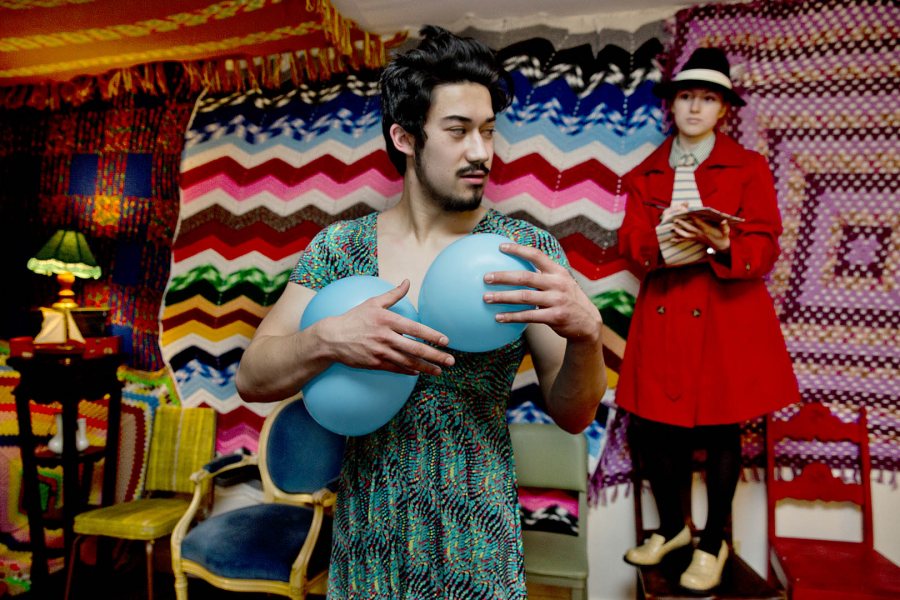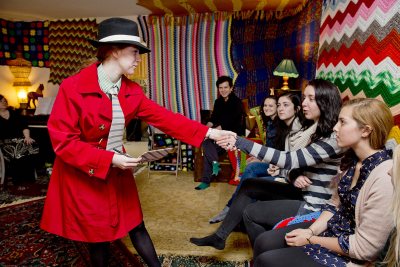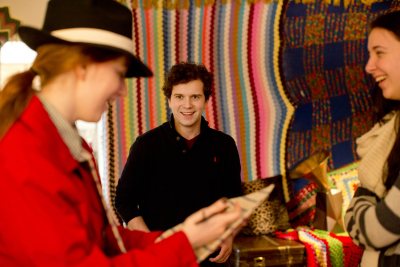
Auer ’15 creates an immersive interpretation of Apollinaire’s surrealist play

Dan Peeples ’17 of Pierpont, New York, portrays the husband in the Bates production of “The Breasts of Tiresias,” directed by Nick Auer ’15. (Phyllis Graber Jensen/Bates College)
Guillaume Apollinaire’s surrealist play The Breasts of Tiresias, adapted and directed for a senior thesis project by Nick Auer ’15, appears in performances at 7 and 9 p.m. Thursday through Sunday, March 19-22, in a surprise location on campus.
Admission is free but tickets are required, available at http://bit.do/tiresias. Seating is limited. Audience members are asked to meet in the lobby of Chase Hall, 56 Campus Ave. For more information, please call 207-786-6161.
Auer of Fairfield, Connecticut, has overseen the creation of an immersive, broadly sensory experience for Bates audiences.
“I’m excited to both throw the performers out of their comfort zone and throw the audience a little bit into the unknown,” Auer says, “and through that new, exciting venture, the themes and the voice of the playwright will come out in more visceral ways.”
Tiresias tackles heady topics including war, feminism and reproduction. The play follows the main character, Therese, as she decides to transform into a man. Shedding her breasts, Therese breaks free of the bonds of domesticity to become a general and a member of the Senate, roles traditionally reserved for men.
Translated from French and revised over the century, the play is a wink and a nod to the Greek myth of the blind prophet Tiresias, who transforms into a woman.
First performed in 1917, Tiresias was the first surrealist play of its kind. Surrealism explores elements of the seemingly illogical or absurd, and often breaks tradition with conventional narrative in order to touch upon the life of the unconscious.

The Bates production of “The Breasts of Tiresias” provides an immersive audience experience. In the red coat is Hope French ’18. (Phyllis Graber Jensen/Bates College)
Auer hopes that his immersive retelling of the play will invite the audience to contribute their own insights. The production allows different parts of the play to be performed simultaneously while the audience travels between rooms. The action will include dance. This all adds up to an engaging, unconventional theatrical experience.
For Auer, bringing out the play’s surrealist qualities has been an exciting artistic and technical challenge. He has worked with theater professor Christine McDowell, who developed the costumes, and with classmate Guen Figueroa of McHenry, Illinois, whose design work for the production entails sets, lighting — and scents, although Auer won’t say more about the olfactory aspect, preferring that people come and have the experience for themselves.
“We’ve wanted to experiment with how we can incorporate all the senses,” Auer says. “Our collaboration has definitely been central to the development of the piece.” Like Auer’s, Figueroa’s work on the play is her senior thesis project in theater.
Auer believes the play resonates with contemporary issues of gender politics. “In the play, the gender binary comes through in terms of: You’re male or you’re female, and there are roles associated with both those genders,” he explains.
“Today, we have expanded our idea of what gender means. So, producing this play in 2015 gives it a contemporary voice by expressing all different sorts of ideas of gender.”
He was drawn to the play by the richness and complexity of Apollinaire’s language, and is interested to see how meaning and historical relevance will come through in a contemporary performance — and in collaboration with each different audience.
“Each performance will be markedly different depending on who is attending it that evening,” he explains. “Their response becomes part of the experience.”


![Sukanya Shukla Ô20 as Eurydice, Ethan Winglass Ô19 as Orpheus, Tim Dugan as Father, Cael Schwartz Ô19 as Man; Lord of Underworld, Madison Shmalo Ô19 as Little Stone, Jack Willis Ô19 Loud Stone, Lucas Allen Ô22 as Big Stone, perform during a dress rehearsal of Eurydice at Schaeffer Theater on October 31, 2018.
Eurydice by Sarah Ruhl
Directed by Dana Professor Martin Andrucki
Orpheus is a musical genius, Eurydice is his beautiful bride-to-be; but on the day of their wedding she dies suddenly. Heartbroken, Orpheus follows his beloved to the underworld, where his music persuades the lords of Hades to allow her to return to lifeÑon one condition. Discover what that is in this modern retelling of a classical myth by Sarah Ruhl, twice-nominated for the Pulitzer Prize in drama. ÒRhapsodically beautiful. . . [An] inexpressibly moving theatrical fable about love, loss and the pain of memory.ÓÑThe New York Times.
Please note: Box Office/Lobby for Eurydice is in The Black Box Theater at the rear of Schaeffer.
Thu, Nov 1, 7:30pm
Fri, Nov 2, 7:30
Sat. Nov 3, 5pm
Sun, Nov 4, 2pm
Mon, Nov 5, 7:30pm
Black Box Theater
DIRECTORÕS NOTE
Orpheus, the greatest musician who ever lived, married the beautiful Eurydice. She died on their wedding day, and descended into the Underworld. The grieving Orpheus followed her there, and by the beauty of his music persuaded the Lord of Hades to allow his bride to rejoin the living. It would be easy: Eurydice would simply follow Orpheus on the path back to life. However, there was one condition: if Orpheus looked behind him to assure that Eurydice was following, she would die againÑforever. He did look back; she did die again, forever; and Orpheus spent the rest of his life in mourning.
The classical version of this story focuses on Orpheus and his grief. Our playwright, Sarah Ruhl, puts Eurydice at the center of her drama, examining the crisis of a young woman who must choose between a romantic lover who doesnÕt understand her, and a dead father who does.
Lethe is one of five rivers in the Underworld. The newly dead are dipped in its water to wash away all their memories of life. It encircles the scene of our play.
PRODUCTION STAFF
Stage Manager; Sound Designer...........................................Deon Custard Ô21
Vocal Director......................................................................Katalin Vecsey Technical Director................................................................ Justin Moriarty
Assistant Technical Director..................................................Aidan McDowell Assistant Scenic Designer................................................Kirstin Koepnick Ô21 Assistant Lighting Designer.................................................Amiee Oakes Ô20 Assistant Stage Manager.....................................Luis David Molina Rueda Ô21 Costume Shop Supervisor... .....................................................Carol Farrell
Costume Shop Crew........................................Jade Zhang '21, Julia Nash '21 ............................Brooke Jandreau '20 Sara Hollenberg Õ19, Talia Sperduto '21 ...............................Jamie Kelleher Õ19, Sukanya Shukla Õ19, Kate Loughlin '22 Wardrobe........................................Brooke Jandreau Õ20, Sara Hollenberg '19 Foley Art.........................................................Henry King Ô22, Noah Pott Ô22 Light Board Operator..........................................................Aimee Oakes Ô20
Sound Board Operator............................................................Henry King Ô22
Carpenters...........................Quinn Healy '19, Haley Crim Õ19, Olivia Gomez '22 ...............................Julia Gutterman '20, Madison Hallowell '20, Henry King '22 .............Michael Hartnett '20, Julie Jesurum '22, Erin Lyons '21, Patrick Reilly '21 ........................Luis David Molina Rueda '20, Yilun Wu '22, Carlo Cremonini '21 ........Kei K. Ching Õ19, Kirstin Koepnick Ô21, Giulia Andronico de Morais Salles '22 ............................Deon Custard '21, Xavier Hayden '19, Gabriele Gucagaite '21 Animation......................................................Mayele Alognon Ô20, Sophie Gerry Ô20 ................................Daisy Diamond Ô19, Maddy Hallowell Ô20, Kirstin Koepnick Ô21 Run Crew..........................................Kei K. Ching Ô19, Gabriele Gucagaite Ô21
Box Office.....................................Alexandra Gilbertson '22, Georgia Moses Õ21 Poster Design............................................................................Lily Kip Ô19 Social Media ..............................................David Garcia Ô20, Nicky Longo Ô21 Custodians......................................................Hussein Kulow, Ed Woodhead
Special Thanks to: John Blanche e; John Corrie](https://www.bates.edu/news/files/2018/11/181031_Eurydice_2870-200x133.jpg)


